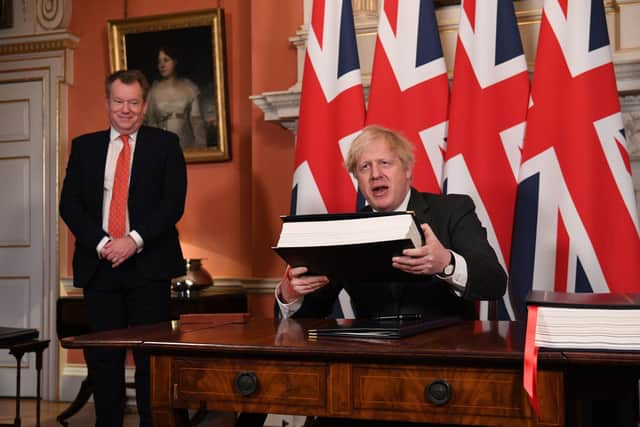Ruth Dudley Edwards: Boris Johnson must re-discover his moral core to solve the Irish Sea border problem


He voted Remain, partly, he said in an article in the Daily Telegraph on February 5, because of fears it might pose problems for Northern Ireland.
“But Brexit is yesterday’s argument,” he concluded. “Today’s argument is about the cohesion of the kingdom.”
I’ll return to him later.


Advertisement
Hide AdAdvertisement
Hide AdOn February 17, Dermot Nesbitt — who in 1983 was chatting on the Queen’s University campus with his colleague Edgar Graham when an IRA assassin shot Graham dead — wrote in this newspaper an article headlined, ‘It beggars belief that unionists say nothing about how the NI Protocol breaches international law’ (see link below).
He had, he said, “held moderate views all my political career, supported the power-sharing executive of 1974 and was to the forefront in advocating support for the Belfast Agreement of 1998.
“If a moderate unionist like myself is deeply angry, I worry where that leaves other strands of unionism.”
Three days later, David Trimble, winner of the Nobel Prize with John Hume for making the Belfast Agreement happen, wrote in the Irish Times under the headline, ‘Tear up the Northern Ireland protocol to save the Belfast Agreement.’
His article was uncharacteristically personal.
Advertisement
Hide AdAdvertisement
Hide Ad“As someone who loves my country, and made real personal and political sacrifices to bring peace and normality to it, I implore my own government, the Irish government and the EU to stop playing fast and loose with the hard-won arrangements in the Belfast Agreement.”
Trimble was indeed under appalling pressure in the 1990s as the DUP left the field and Prime Minister Blair flirted with Sinn Fein. But although nationalists had massive support in the Republic, in Irish-America and parliament, Trimble and a small band of unionist negotiators and supporters outwitted violent nationalism to bring an end to terrorism and provide a democratic alternative to pursue different aspirations.
“We had endured 35 years of a bitter terrorist conflict perpetrated by those who believed that by terrorising the Northern Ireland population, bombing prime targets in Britain and killing soldiers and police officers they could force Northern Ireland out of the UK,” he wrote. But they had not succeeded.
Yet now, in his view, “Northern Ireland…has been annexed by the EU and is subject to EU laws and an EU court without any right of dissent. I personally feel betrayed”.
Advertisement
Hide AdAdvertisement
Hide AdYesterday the headline for commentator Alex Kane in the Irish Times was, ‘Unsettled unionists caught in perfect storm’.
Kane doesn’t do drama, so it was worrying that he said, “I can’t remember a moment when unionism has been so unsettled. The fall of the Stormont parliament (1972), the Sunningdale Agreement (1974) and the Anglo-Irish Agreement (1985) all meant challenges and anger, but all were offset by the fact unionism remained electorally strong …
“I’m not aware of a significant section of the pro-Union/unionist community (including those who voted Remain in 2016 and who have been very critical of the DUP’s relationship with the Conservative party’s hardest of hard-line Brexiteers) which is not angry with Northern Ireland protocol.”
Court challenges to the protocol are mooted, though they’re by no means plain sailing.
Advertisement
Hide AdAdvertisement
Hide AdProfessor Bogdanor believes it arguably breaches the 1800 Act of Union which provides for Northern Ireland ‘the same privileges’ and ‘encouragements’ in trade as the rest of the UK.”
Yet commentator Newton Emerson is not alone in thinking that “The protocol doesn’t breach the GFA [Good Friday Agreement] because Brexit itself doesn’t breach the GFA.”
However, Bogdanor also addressed what is to me the moral core of the issue: “Either the regulatory border is in the Irish Sea, as nationalists want, or it is on the island of Ireland, as unionists want, and should also be what a unionist government at Westminster ought to want.
“But a unionist government negotiated a nationalist solution. Anything else, some suggest, would be too dangerous since it would lead to a revival of IRA terrorism — a somewhat disreputable argument: accept our solution, or else. But continuing with the protocol could also lead to a revival of terrorism from unionist militants.”
Advertisement
Hide AdAdvertisement
Hide AdI’m with Bogdanor when he says the issue shouldn’t be decided on that basis, “but on the basis of which solution is fairest to the citizens of Northern Ireland, who are British taxpayers now deprived their equal citizenship. That fundamental consideration points to a border on the island of Ireland”.
Unionists are in a stronger position than they seem to realise.
They have the self-respect that goes with occupying the moral high ground.
Unlike nationalists, almost none of them ever vote for murderers and they’re not going to support them now.
Advertisement
Hide AdAdvertisement
Hide AdThe EU Commission and the Irish government have demonstrated that a land border can be breached if it affects their interests, so there is no excuse for the British government not following the moral route, agreeing technical solutions that render the land border invisible and scrapping that stupid sea border.
The Union is not in danger: no significant Irish political leaders except Sinn Fein want a border poll.
The British government seems to have cracked Covid.
It’s time for the prime minister to rediscover his moral core and unleash his negotiator Lord Frost to pursue a solution that is fair to the law-abiding people of Northern Ireland.
• Dermot Nesbitt: It beggars belief that unionists say nothing about how the NI Protocol breaches international law
Advertisement
Hide AdAdvertisement
Hide Ad• Alex Kane: Why even a moderate like Dermot is right to be angry at the mess we find ourselves in ——— ———A message from the Editor:Thank you for reading this story on our website. While I have your attention, I also have an important request to make of you.With the coronavirus lockdown having a major impact on many of our advertisers — and consequently the revenue we receive — we are more reliant than ever on you taking out a digital subscription.Subscribe to newsletter.co.uk and enjoy unlimited access to the best Northern Ireland and UK news and information online and on our app. With a digital subscription, you can read more than 5 articles, see fewer ads, enjoy faster load times, and get access to exclusive newsletters and content. Visit https://www.newsletter.co.uk/subscriptions now to sign up.
Our journalism costs money and we rely on advertising, print and digital revenues to help to support them. By supporting us, we are able to support you in providing trusted, fact-checked content for this website.
Alistair Bushe
Editor